Why wheat plays an important role in the future world food supply
Textured wheat proteins as a contribution to securing a worldwide sustainable diet.
How will we feed 9 billion people in the future? This question can’t be answered easily, as the answer is complex. However, one thing is certain: the renewable raw material wheat will be of crucial importance to secure the food supply of the world’s growing population.
Already today, wheat is the most frequently cultivated crop in the world, with around 220 million hectares under cultivation. In combination with new technological approaches in the natural refinement of wheat-based raw materials, such as extrusion, the food industry has an important tool at its disposal to ensure a nutritional basis and to develop alternative sustainable food concepts.
Proteins as a key role in nutrition
With a growing world population and, at the same time, ever scarcer resources, food security is one of the key challenges for our and future generations. Already today, it is our responsibility to create innovations that allow a sustainable and globally applicable nutrition concept for the future, allowing us to use our natural raw materials as efficiently and responsibly as possible.
When it comes to the worldwide supply of high-quality food, the availability of proteins plays a key role. Large parts of the world’s population do not have adequate access to nutritious, protein-rich food. By contrast, industrialised and emerging countries are already struggling with the health and environmental consequences of over-eating animal proteins and products. The high animal food consumption has negative impacts on ecosystems, the climate and, ultimately, on our planet’s biodiversity.
Responsible use of natural resources
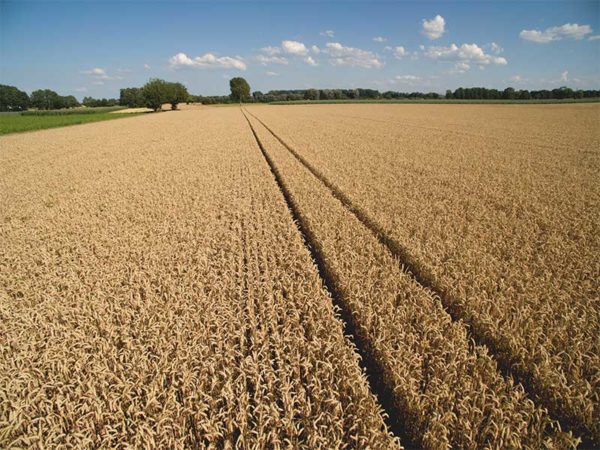
It does not have to be our goal to completely replace the consumption of animal products. In many countries, meat production means a large and secure source of income for agricultural families and for upstream and downstream industries in the value chain. However, especially in the major industrial nations, any reduction in the consumption of animal food will conserve our limited resources.
To understand the global responsibility of this issue, it’s helpful to take a look at the consumption of agricultural land necessary to produce the totality of what we consume.
The great demand for meat in industrialised countries is always accompanied by a high consumption of agricultural land to produce the required feed. Comparatively small countries with intensive animal husbandry, such as Germany, do not have enough land to produce all the required food and feed, meaning we need additional agricultural land in other parts of the world. Essentially, this has two negative effects. On the one hand, the surfaces used for animal feed production for export purposes are no longer available for the local population’s food cultivation. On the other hand, natural landscapes are converted into cultivated land for animal feed, which leads to the loss of biodiversity and species diversity. We can only tackle this global problem with innovative solutions that reduce our consumption of resources and land.
Wheat as an important component for a plant-based and sustainable diet
Wheat is one of the oldest cultivated plants in the world and has always been one of the most important staples for many countries. The wheat grain has a high nutritional value. The wheat grain consists of approx. 70% starch, 14% protein and, for example, high-quality amino acids, unsaturated fatty acids, fibre, vitamins, and minerals. Simultaneously, the high nutritional value and very good storage properties have already made wheat indispensable for world nutrition in the past.
Wheat-based raw materials, such as wheat starch and wheat proteins, are essential for modern food production. Bread and baked goods cover 20% of our daily calorie consumption and contribute significantly to a balanced diet. We are fascinated by the idea that one of the oldest crops in the world can use new processing technologies to provide an important answer to new challenges. The natural ingredients of wheat improve quality and reduce resource consumption in the end-consumer product in a wide range of applications.
As a partner to the food industry, it is our aim to support resource conservation even more strongly in the future and to create equivalent alternatives to meat with our vegetable proteins. As a food specialist at the Crespel & Deiters Group, Loryma offers textured wheat proteins with its Lory® Tex products, which enable the sustainable and simple production of vegetarian and vegan alternatives to animal products.
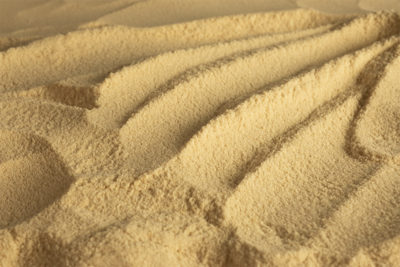
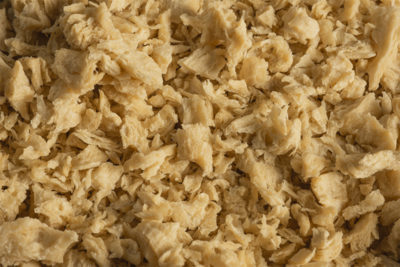
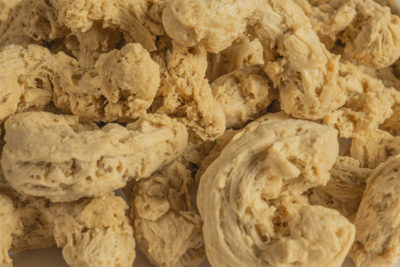
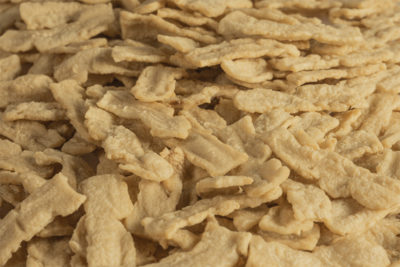
Crespel & Deiters provides the textured wheat proteins for easy further processing as chunks, flakes, powder or granules.
The term “textured” stands for the versatile and innovative process technology of extrusion. The extrusion of proteins is a physical process in which the product is pressed through a pre-defined opening under the influence of pressure and temperature and at the end retains the shape obtained there. Within the scope of this process technology, the range of possibilities of the end-consumer product with regard to texture and appearance are virtually unlimited. The result is a sustainable and natural replacement for the meat component in numerous and diverse applications. The combination of different plant proteins, to which we contribute a part, supplies the human body with the essential amino acids. The reduction of animal protein does not mean any loss in our nutritional value.
Joint successful implementation of new, sustainable nutrition concepts
We are experiencing a change in the awareness of nutrition in general and of the sustainability and quality of food in particular, and this will continue to change. The food industry can already contribute to implementing the requirements of future nutrition concepts and contribute in making healthy, sustainably produced food available across the board. Crespel & Deiters also takes on the responsibility and task of contributing to the development and provision of more nutritious food. With innovative textured wheat proteins obtained from GMO-free EU wheat and processed or refined at our German site to ensure high quality, we are facilitating the long-term transition to a healthy diet that benefits and protects people, animals and the environment. With textured wheat proteins, Loryma offers the basis for new food concepts and sustainable food innovations.
Textured wheat proteins: Solutions for new food concepts.
- Pure vegetable protein source
- Made of GMO-free EU wheat
- Recreates the textures of all types of meat for vegetarian and vegan alternatives
- Can also reproduce fishlike textures
- Increases protein and nutrient content